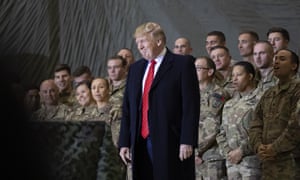Cuts would decrease military presence from 4,500 to 2,500 in Afghanistan and from 3,000 to 2,500 in Iraq

The Republican Senate leader, Mitch McConnell, said a hasty withdrawal would “hurt our allies and delight the people who wish us harm”.
“The consequences of a premature American exit would likely be even worse than President Obama’s withdrawal from Iraq back in 2011, which fueled the rise of Isis and a new round of global terrorism,” McConnell said.
Some analysts suggested however, that it is unclear whether the orders will be implemented as fast as Trump would like in order to secure his legacy on ending America’s “endless wars”, and that it would have only symbolic significance weeks, or even days before Biden enters the White House on 20 January.
There was agreement however that the reported Trump plans do not represent the “conditions-based” withdrawal the administration outlined in its February deal signed in Doha with the Taliban.
The former defence secretary, Mark Esper, was abruptly fired after reportedly resisting an accelerated timetable for withdrawal, saying conditions for withdrawal had not been met by the Taliban.
“The Taliban in Doha tell anyone who cares to listen that the US promised to hand over control of Afghanistan to them so they do not really need to negotiate – the Afghan government delegation will have to surrender to them,” Michael Semple, a former EU envoy to Afghanistan, said.
He added: “The Taliban are bound to exploit any further troop withdrawal to boost their victory narrative. They can tell their own troops, and those of the Afghan government, that the US withdrawal is not conditional on Taliban stopping fighting, because the US has OK’d the Taliban capture of Kabul, which is what they are working towards.”
“It just doesn’t make sense,” Semple, now a professor at Queen’s University, Belfast, added. “Nobody wants to put the Taliban back in power, but the Taliban are pushing very hard to get back in power, and they are arrogant enough to think that they can sweep the lot.”
Laurel Miller, a former acting US special envoy for Afghanistan and Pakistan, said much would depend on how any withdrawal orders were implemented.
“I would want to know the effects on military operations in terms of base closures, and what does it mean in terms of air power,” Miller said. “And I would assume that [the defence department] is going to try to hedge this through use of contractors, and maybe even some creative accounting about what counts as the number of troops deployed in Afghanistan versus in the theatre more broadly.”
Andrew Watkins, a senior analyst on Afghanistan at the International Crisis Group, said he had been told by US officials that there would still be a “full counterterrorism and offensive strike capability across the country, even at a headcount of 2500”.
“Politically, we are so close to the inauguration of the Biden administration that the impact this reduction may have made, say a year ago, could just breeze past most of the actors on the ground, as they wait to see what comes early next year,” Watkins said.
“Certainly, the Taliban will view the additional drawdown favourably, but they have already sharply changed their tune [from aggressively victorious to conciliatory] in the days since the US election results became more clear. That suggests they may continue to hedge, to wait and see what Biden will do – rather than take Trump’s order as a “green light” for any drastic action.”
